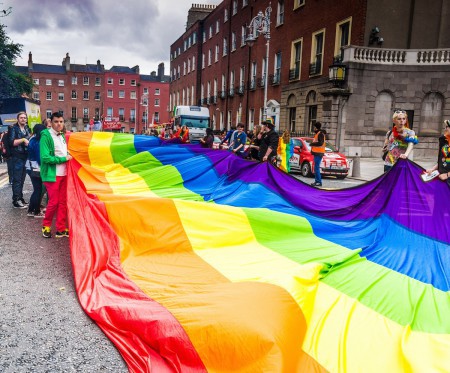By Rebecca K. Smith, CLDC Board President & Cooperating Attorney 
Last week in Ireland, for the first time ever, an entire country decided to legalize gay marriage by a popular vote, also known as a referendum. While other nations have legalized gay marriage with legislation or court rulings, this is the first time gay marriage has been legalized by a direct vote of the people. Despite Ireland’s reputation as a Catholic and fairly conservative country, 62.1 % of the Irish voters — 1.2 million people — voted to legalize gay marriage last Friday. Ireland’s Dublin Archbishop Diarmuid Martin admitted: “It’s a social revolution . . . . The church needs to do a reality check right across the board.” Ireland joins Canada, Brazil, Uruguay, Argentina, South Africa, New Zealand, Portugal, Spain, France, Slovenia, Belgium, Luxembourg, Netherlands, Denmark, Sweden, Norway, Finland, Estonia, and Iceland in the group of countries that have legalized gay marriage throughout their borders.
Notably absent from this list of countries is the United States. The United States is part of a small club of three countries — U.S., United Kingdom, and Mexico — in which gay marriage is permitted in some jurisdictions but not others. In these schizophrenic countries, gay marriage is lawful on one side of an imaginary line, but becomes illegal on the other side of the imaginary line.
In the U.S., the Supreme Court potentially could remedy this problem next month. Back in April, the court heard two and a half hours of oral argument on the issue of state bans against gay marriage. Currently, the following 15 states ban gay marriage either by state law or state constitution: Arkansas, Georgia, Kentucky, Louisiana, Michigan, Nebraska, North Dakota, Ohio, South Dakota, Texas, Missouri, Mississippi, Tennessee, Alabama, and Florida. Many of these states have been challenged in court and there are several court orders that have already found such individual state bans to be unlawful, such as in Alabama, Florida, Arkansas, Louisiana, Mississippi, Missouri, Nebraska, South Dakota, and Texas.
The two issues currently before the U.S. Supreme Court, however, are national in scope: (1) whether the U.S. Constitution requires states to allow gay marriage, and therefore trumps and invalidates individual state bans on gay marriage, and (2) whether states that ban gay marriage must recognize marriages performed in other states that do allow gay marriage.
Proponents of state bans on gay marriage essentially argued before the Supreme Court that the bans must remain in place because gay marriage does not comport with a “traditional,” i.e. old, definition of marriage, and that the purpose of marriage is procreation, which cannot happen biologically between two individuals of the same sex. However, under this twisted logic, African-Americans would still be slaves and women would be still be property because that was also “traditional” in this country for many years. In this context, the word “traditional” is simply a euphemism for old and oppressive. Additionally, under the “procreation” logic, any opposite sex couple that did not intend to use their own egg and sperm to procreate would not be permitted to marry. No such perquisite is imposed on opposite sex couples prior to receiving a marriage license. The fact that proponents of bans on gay marriage must resort to such absurd arguments indicates that their position lacks a rational basis in the 21st Century.
Significantly, the U.S. Department of Justice joined in the case to argue in favor of gay marriage and likened the issue of marriage equality to the effort to end racial segregation. The federal government argued that the Equal Protection guarantee of the 14th Amendment protects gay marriage.
A decision will be issued on this case by the end of June. So, within the next month we will learn whether the U.S. is prepared to shed its schizophrenia, enter the 21st Century, and join Ireland and 19 other countries in recognizing legal equality for the LGBT community by legalizing gay marriage across the country.
